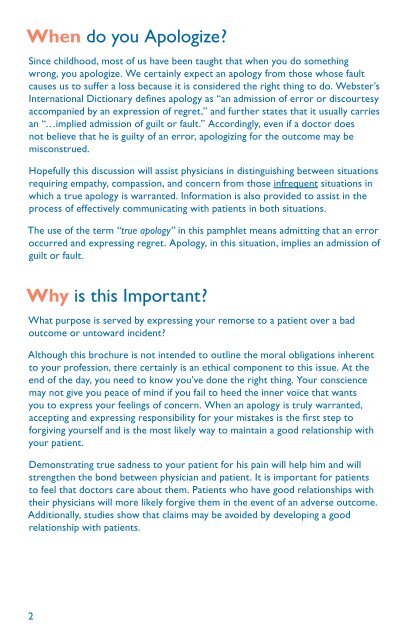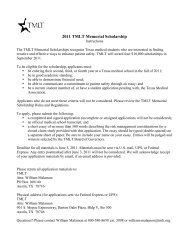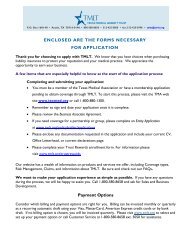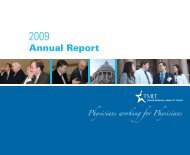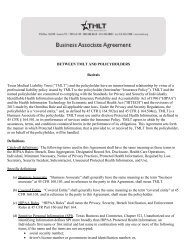Medical errors, disclosure, and the role of apology: a tool for ... - TMLT
Medical errors, disclosure, and the role of apology: a tool for ... - TMLT
Medical errors, disclosure, and the role of apology: a tool for ... - TMLT
Create successful ePaper yourself
Turn your PDF publications into a flip-book with our unique Google optimized e-Paper software.
When do you Apologize<br />
Since childhood, most <strong>of</strong> us have been taught that when you do something<br />
wrong, you apologize. We certainly expect an <strong>apology</strong> from those whose fault<br />
causes us to suffer a loss because it is considered <strong>the</strong> right thing to do. Webster’s<br />
International Dictionary defines <strong>apology</strong> as “an admission <strong>of</strong> error or discourtesy<br />
accompanied by an expression <strong>of</strong> regret,” <strong>and</strong> fur<strong>the</strong>r states that it usually carries<br />
an “…implied admission <strong>of</strong> guilt or fault.” Accordingly, even if a doctor does<br />
not believe that he is guilty <strong>of</strong> an error, apologizing <strong>for</strong> <strong>the</strong> outcome may be<br />
misconstrued.<br />
Hopefully this discussion will assist physicians in distinguishing between situations<br />
requiring empathy, compassion, <strong>and</strong> concern from those infrequent situations in<br />
which a true <strong>apology</strong> is warranted. In<strong>for</strong>mation is also provided to assist in <strong>the</strong><br />
process <strong>of</strong> effectively communicating with patients in both situations.<br />
The use <strong>of</strong> <strong>the</strong> term “true <strong>apology</strong>” in this pamphlet means admitting that an error<br />
occurred <strong>and</strong> expressing regret. Apology, in this situation, implies an admission <strong>of</strong><br />
guilt or fault.<br />
Why is this Important<br />
What purpose is served by expressing your remorse to a patient over a bad<br />
outcome or untoward incident<br />
Although this brochure is not intended to outline <strong>the</strong> moral obligations inherent<br />
to your pr<strong>of</strong>ession, <strong>the</strong>re certainly is an ethical component to this issue. At <strong>the</strong><br />
end <strong>of</strong> <strong>the</strong> day, you need to know you’ve done <strong>the</strong> right thing. Your conscience<br />
may not give you peace <strong>of</strong> mind if you fail to heed <strong>the</strong> inner voice that wants<br />
you to express your feelings <strong>of</strong> concern. When an <strong>apology</strong> is truly warranted,<br />
accepting <strong>and</strong> expressing responsibility <strong>for</strong> your mistakes is <strong>the</strong> first step to<br />
<strong>for</strong>giving yourself <strong>and</strong> is <strong>the</strong> most likely way to maintain a good relationship with<br />
your patient.<br />
Demonstrating true sadness to your patient <strong>for</strong> his pain will help him <strong>and</strong> will<br />
streng<strong>the</strong>n <strong>the</strong> bond between physician <strong>and</strong> patient. It is important <strong>for</strong> patients<br />
to feel that doctors care about <strong>the</strong>m. Patients who have good relationships with<br />
<strong>the</strong>ir physicians will more likely <strong>for</strong>give <strong>the</strong>m in <strong>the</strong> event <strong>of</strong> an adverse outcome.<br />
Additionally, studies show that claims may be avoided by developing a good<br />
relationship with patients.


